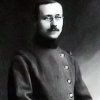Max Stirner

Max Stirner
Johann Kaspar Schmidt, better known as Max Stirner, was a German philosopher. He is often seen as one of the forerunners of nihilism, existentialism, psychoanalytic theory, postmodernism, and anarchism, especially of individualist anarchism. Stirner's main work is The Ego and Its Own, also known as The Ego and His Own. This work was first published in 1845 in Leipzig, and has since appeared in numerous editions and translations...
NationalityGerman
ProfessionPhilosopher
Date of Birth25 October 1806
CountryGermany
The divine is God's concern; the human, man's. My concern is neither the divine nor the human, not the true, good, just, free, etc., but solely what is mine, and it is not a general one, but is -- unique, as I am unique. Nothing is more to me than myself!
Freedom cannot be granted. It must be taken.
Whoever will be free must make himself free. Freedom is no fairy gift to fall into a man's lap. What is freedom? To have the will to be responsible for one's self.
When every one is to cultivate himself into man, condemning a man to machine-like labor amounts to the same thing as slavery. If a factory-worker must tire himself to death twelve hours and more, he is cut off from becoming man. Every labor is to have the intent that the man be satisfied.... His labor is nothing taken by itself, has no object in itself, is nothing complete in itself; he labors only into another's hands, and is used (exploited) by this other.
We don't call it sin today, we call it self-expression.
Before what is sacred, people lose all sense of power and all confidence; they occupy a powerless and humble attitude toward it. And yet no thing is sacred of itself, but by my declaring it sacred, by my declaration, my judgment, my bending the knee; in short, by my conscience.
The truth wears longer than all the gods; for it is only in the truth's service, and for love of it, that people have overthrown the gods and at last God himself. "The truth" outlasts the downfall of the world of gods, for it is the immortal soul of this transitory world of gods; it is Deity itself.
One is not worthy to have what one, through weakness, lets be taken from him; one is not worthy of it because one is not capable of it.
Nothing is more to me than myself.
Where the world comes in my way - and it comes in my way everywhere - I consume it to quiet the hunger of my egoism. For me you are nothing but - my food, even as I too am fed upon and turned to use by you. We have only one relation to each other, that of usableness, of utility, of use. We owe each other nothing, for what I seem to owe you I owe at most to myself. If I show you a cheery air in order to cheer you likewise, then your cheeriness is of consequence to me, and my air serves my wish; to a thousand others, whom I do not aim to cheer, I do not show it.
Is not all the stupid chatter of most of our newspapers the babble of fools who suffer from the fixed idea of morality, legality, christianity and so forth, and only seem to go about free because the madhouse in which they walk takes in so broad a space?
People is the name of the body, State of the spirit, of that ruling person that has hitherto suppressed me.
Thus the radii of all education run together into one center which is called personality.
It is not recognized in the full amplitude of the word that all freedom is essentially self-liberation - that I can have only so much freedom as I procure for myself by my owness.